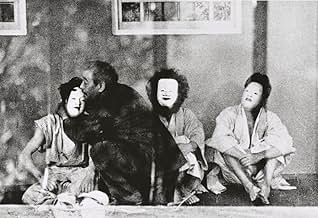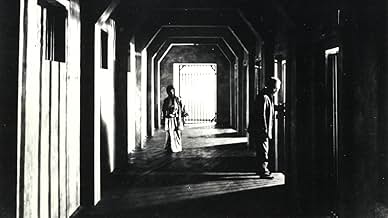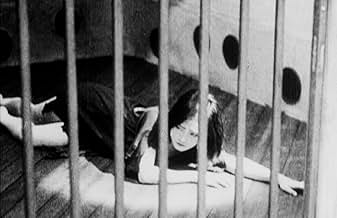IMDb RATING
7.3/10
4.8K
YOUR RATING
A man takes a job at an asylum with hopes of freeing his imprisoned wife.A man takes a job at an asylum with hopes of freeing his imprisoned wife.A man takes a job at an asylum with hopes of freeing his imprisoned wife.
Storyline
Did you know
- TriviaThis film was deemed lost for more than forty years, but it was rediscovered by its director, Teinosuke Kinugasa, in a rice cans in 1971.
- Alternate versionsReissued in Japan in 1973 with musical score replacing original benshi.
- ConnectionsFeatured in The Story of Film: An Odyssey: The Golden Age of World Cinema (2011)
Featured review
A Page of Madness is an expressionistic Japanese film that has not gotten the attention it deserves. I was introduced to the film through the fifteen part documentary series The Story of Film an Odyssey. Fortunately, a friend had dubbed the silent film off of Turner Classic Movies during one of its infrequent showings.
The clip in The Story of a Film an Odyssey looked like some mad movie genius had crossed the set designs from a German expressionist film with the fast edits of a classic Russian work. This clip was from the attention grabbing opening of A Page of Madness. A janitor wanders an insane asylum at night during a storm. The storm has a strange effect on the patients and, presumably, the attendant. The edits are fast, conveying mystery and terror like in a horror film. This sequence (and a sequence at the climax) is nothing short of brilliance.
From here the film turns to a narrative, although an oblique one. This clerk or janitor seems to have an unhealthy fixation on one of the female patients. . . and more of one for this patient's daughter. The janitor clearly knew this family before the mother was committed. IMDb says that the woman is the janitor's wife. I am not doubting this, but the film is not clear on this point. What is clear is that the janitor is suffering from a lack of love. This janitor is not the only one. One patient is compelled to dance suggestively and nearly starts a riot. By contrast, the doctors appear clinical and ineffectual. As the film goes along, the protagonist's mental state seems to wane.
Much about the plot is unclear. Many Japanese silent were narrated by a spokesman in the theater. This may have been the case with A Page of Madness; thus, some of the ambiguity would have been explained by the live narrator. I prefer to think the ambiguity was deliberate and never explained. The film has a wonderful sense of mystery to it. I don't want any more of an explanation. I (and probably most film fans) watch a lot of movies that are merely fair. These films are watchable, but they do not stay in one's memory. That is why A Page of Madness is so stunning. It kicks the door down and announces itself to the world. I feel less like a reviewer than a herald for a lost classic. Are you listening Criterion?
The clip in The Story of a Film an Odyssey looked like some mad movie genius had crossed the set designs from a German expressionist film with the fast edits of a classic Russian work. This clip was from the attention grabbing opening of A Page of Madness. A janitor wanders an insane asylum at night during a storm. The storm has a strange effect on the patients and, presumably, the attendant. The edits are fast, conveying mystery and terror like in a horror film. This sequence (and a sequence at the climax) is nothing short of brilliance.
From here the film turns to a narrative, although an oblique one. This clerk or janitor seems to have an unhealthy fixation on one of the female patients. . . and more of one for this patient's daughter. The janitor clearly knew this family before the mother was committed. IMDb says that the woman is the janitor's wife. I am not doubting this, but the film is not clear on this point. What is clear is that the janitor is suffering from a lack of love. This janitor is not the only one. One patient is compelled to dance suggestively and nearly starts a riot. By contrast, the doctors appear clinical and ineffectual. As the film goes along, the protagonist's mental state seems to wane.
Much about the plot is unclear. Many Japanese silent were narrated by a spokesman in the theater. This may have been the case with A Page of Madness; thus, some of the ambiguity would have been explained by the live narrator. I prefer to think the ambiguity was deliberate and never explained. The film has a wonderful sense of mystery to it. I don't want any more of an explanation. I (and probably most film fans) watch a lot of movies that are merely fair. These films are watchable, but they do not stay in one's memory. That is why A Page of Madness is so stunning. It kicks the door down and announces itself to the world. I feel less like a reviewer than a herald for a lost classic. Are you listening Criterion?
- How long is A Page of Madness?Powered by Alexa
Details
Box office
- Budget
- ¥20,000 (estimated)
- Runtime1 hour 10 minutes
- Color
- Sound mix
- Aspect ratio
- 1.33 : 1
Contribute to this page
Suggest an edit or add missing content




















